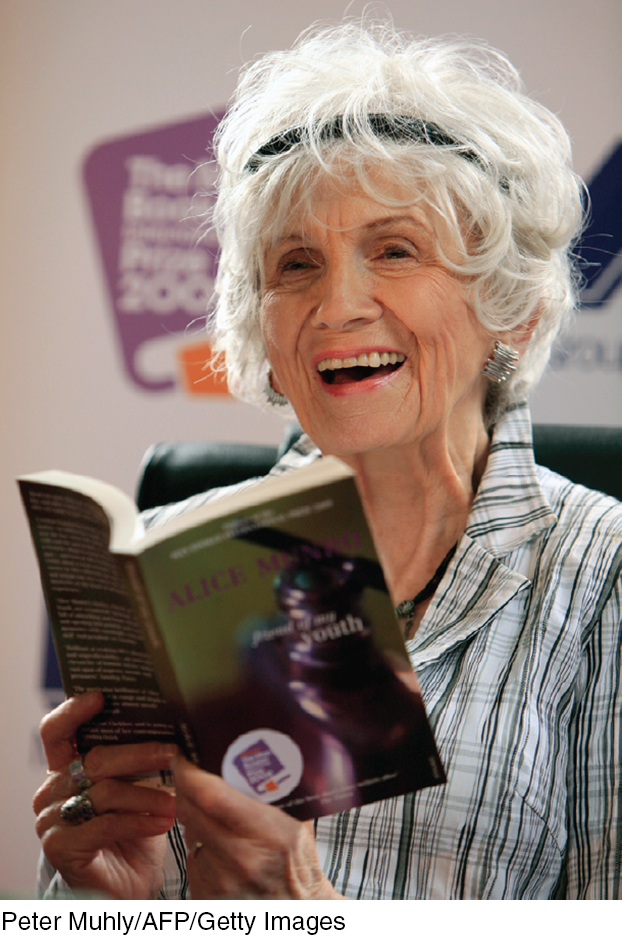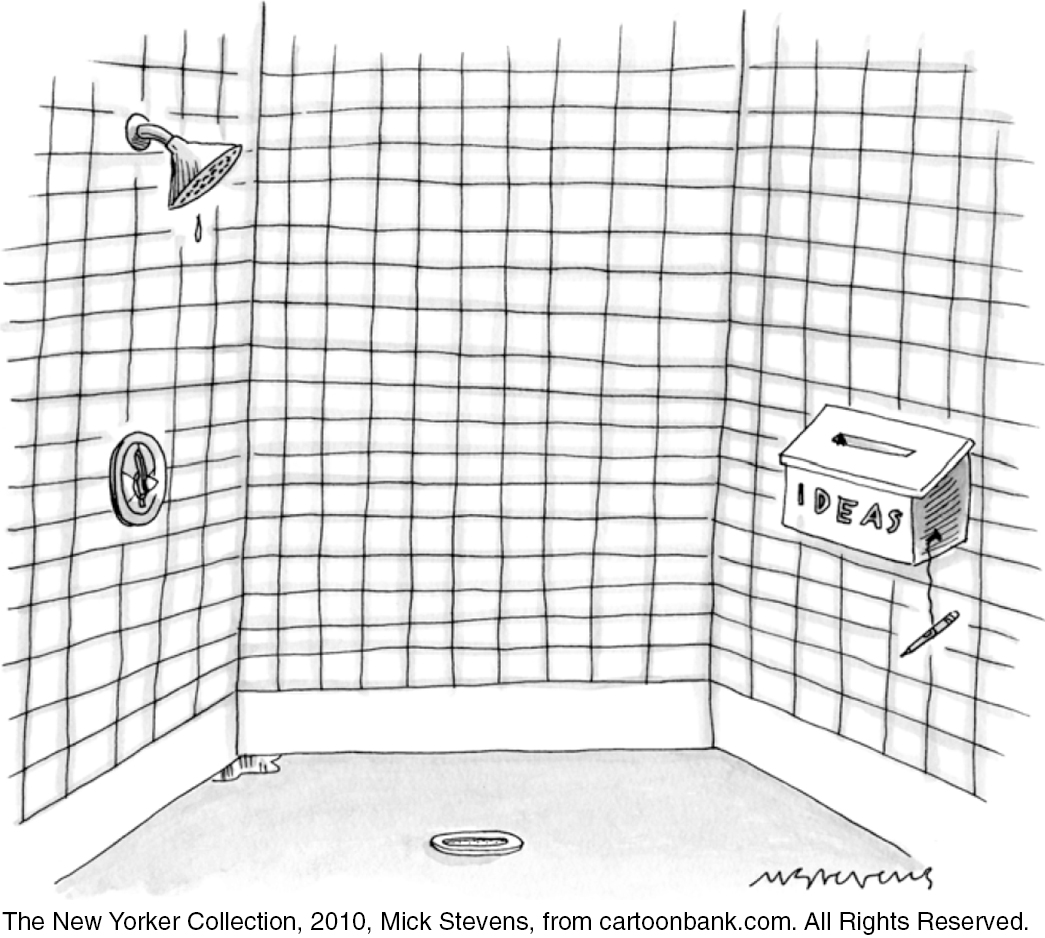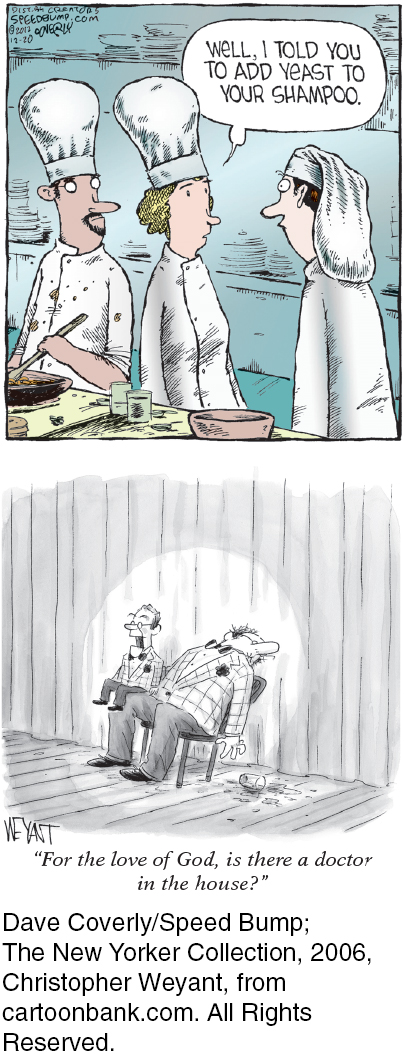25.4 Thinking Creatively
25-
creativity the ability to produce new and valuable ideas.
Creativity is the ability to produce ideas that are both novel and valuable (Hennessey & Amabile, 2010). Consider Princeton mathematician Andrew Wiles’ incredible, creative moment in 1994. Pierre de Fermat, a seventeenth-
Wiles had pondered Fermat’s theorem for more than 30 years and had come to the brink of a solution. One morning, out of the blue, the final “incredible revelation” struck him. “It was so indescribably beautiful; it was so simple and so elegant. I couldn’t understand how I’d missed it. . . . It was the most important moment of my working life” (Singh, 1997, p. 25).
convergent thinking narrowing the available problem solutions to determine the single best solution.
divergent thinking expanding the number of possible problem solutions; creative thinking that diverges in different directions.
Creativity like Wiles’ is supported by a certain level of aptitude (ability to learn). Those who score exceptionally high in quantitative (math) aptitude as 13-

Robert Sternberg and his colleagues believe creativity has five components (Sternberg, 1988, 2003; Sternberg & Lubart, 1991, 1992):
Expertise—well-
developed knowledge— furnishes the ideas, images, and phrases we use as mental building blocks. “Chance favors only the prepared mind,” observed Louis Pasteur. The more blocks we have, the more chances we have to combine them in novel ways. Wiles’ well- developed knowledge put the needed theorems and methods at his disposal. Imaginative thinking skills provide the ability to see things in novel ways, to recognize patterns, and to make connections. Having mastered a problem’s basic elements, we redefine or explore it in a new way. Wiles’ imaginative solution combined two partial solutions.
A venturesome personality seeks new experiences, tolerates ambiguity and risk, and perseveres in overcoming obstacles. Wiles said he labored in near-
isolation from the mathematics community partly to stay focused and avoid distraction. Such determination is an enduring trait. Intrinsic motivation is the quality of being driven more by interest, satisfaction, and challenge than by external pressures (Amabile & Hennessey, 1992). Creative people focus less on extrinsic motivators—
meeting deadlines, impressing people, or making money— than on the pleasure and stimulation of the work itself. As Wiles noted, “I was so obsessed by this problem that . . . I was thinking about it all the time— [from] when I woke up in the morning to when I went to sleep at night” (Singh & Riber, 1997). A creative environment sparks, supports, and refines creative ideas. Wiles stood on the shoulders of others and collaborated with a former student. After studying the careers of 2026 prominent scientists and inventors, Dean Keith Simonton (1992) noted that the most eminent were mentored, challenged, and supported by their colleagues. Creativity-
fostering environments support innovation, team building, and communication (Hülsheger et al., 2009). They also minimize anxiety and foster contemplation (Byron & Khazanchi, 2011). After Jonas Salk solved a problem that led to the polio vaccine while visiting a monastery, he designed the Salk Institute to provide contemplative spaces where scientists could work without interruption (Sternberg, 2006).

For those seeking to boost the creative process, research offers some ideas:
Develop your expertise. Ask yourself what you care about and most enjoy. Follow your passion and become an expert at something.
Allow time for incubation. With enough available knowledge—
the mental building blocks we need to create novel connections— a period of inattention to a problem (“sleeping on it”) allows for automatic processing to form associations (Zhong et al., 2008). So think hard on a problem, then set it aside and come back to it later. Set aside time for the mind to roam freely. Take time away from attention-
absorbing distractions. Creativity springs from “defocused attention” (Simonton, 2012a,b). So jog, go for a long walk, or meditate. Serenity seeds spontaneity. Page 326Experience other cultures and ways of thinking. Living abroad sets the creative juices flowing. Even after controlling for other variables, students who have spent time abroad and embraced their host culture are more adept at working out creative solutions to problems (Lee et al., 2012; Tadmor et al., 2012). Multicultural experiences expose us to multiple perspectives and facilitate flexible thinking, and may also trigger another stimulus for creativity—
a sense of difference from others (Kim et al., 2013; Ritter et al., 2012).

RETRIEVE IT
Match the process or strategy listed below with the description.
Question
Algorithm Intuition Insight Heuristics Fixation Confirmation bias Overconfidence Creativity Framing Belief perseverance | The ability to produce novel and valuable ideas. Inability to view problems from a new angle; focuses thinking but hinders creative problem solving. Fast, automatic, effortless feelings and thoughts based on our experience; adaptive but can lead us to overfeel and underthink. Methodological rule or procedure that guarantees a solution but requires time and effort. Tendency to search for support for our own views and ignore contradictory evidence. Ignoring evidence that proves our beliefs are wrong; closes our mind to new ideas. Overestimating the accuracy of our beliefs and judgments; allows us to be happy and to make decisions easily, but puts us at risk for errors. Simple thinking shortcuts that allow us to act quickly and efficiently, but put us at risk for errors. Wording a question or statement so that it evokes a desired response; can influence others' decisions and produce a misleading result. Sudden Aha! reaction that provides instant realization of the solution. |